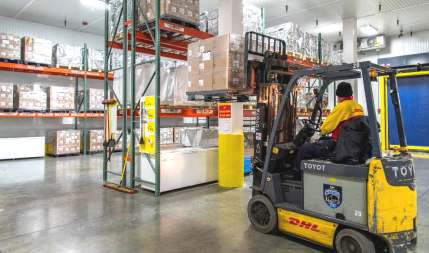Transforming Logistics: Unveiling Trends and Innovations Shaping the Future of Supply Chains
In an exclusive interview with Poonam Chawla, Associate Publisher of Air Cargo Update, Amadou Diallo, CEO of DHL Global Forwarding Middle East & Africa, shares insights into the dynamic landscape of logistics. From the impact of Artificial Intelligence (AI) on supply chains to sustainable practices in packaging and transportation, Diallo delves into key trends and DHL’s pioneering role in driving innovation across the industry.
Artificial Intelligence is at the forefront of technological developments. Could you give specific examples of how AI impacts logistics and supply chains?
Research indicates that 51% of businesses harness AI primarily to bolster innovation and 47% use it to enhance customer experiences. However, only a quarter of these organizations recognize AI’s potential to unlock new revenue streams. This suggests a substantial underestimation of AI’s role as a driver for both top-line growth and market differentiation.
In the logistics sector, AI is revolutionizing logistics and supply chain management by enabling efficiency in critical business operations, leading to faster delivery times and reduced fuel costs.
In regions like the Middle East, the integration of AI into supply chain practices is setting the stage for a major overhaul of the logistics sector. By adopting AI-driven tools like predictive analytics and automated inventory management, companies are not only boosting operational efficiency but are also positioning themselves as competitive players on the global stage. This strategic adoption of AI marks a critical shift from traditional methods to a more agile and data-driven approach in logistics.
The imminent future will be driven by digitalization and sustainability. What trends do you see in both that benefit the logistics industry?
The logistics industry is rapidly evolving under the dual influences of digitalization and sustainability. Artificial Intelligence (AI) is a major trend, already implemented by 36% of businesses to enhance supply chain operations, with projections suggesting a productivity increase of over 20% by 2035. In the Middle East, AI’s impact is pronounced in e-commerce markets like the UAE and Saudi Arabia, driving advances in predictive analytics and automated warehousing. Alongside AI, supply chain diversification is gaining traction as companies strive to mitigate risks from global disruptions by developing more flexible and strategically located logistics networks. Sustainability is also a key focus, reflected in services like DHL’s GoGreen Plus, which promotes the use of sustainable fuels and electric vehicles to reduce GHG-emissions in supply chains. The Internet of Things (IoT) is set to further revolutionize the industry with smart labels that enhance visibility and improve inventory management through real-time data transfer using technologies like QR codes and RFID.
Concurrently, as digital vulnerabilities increase, cybersecurity is becoming a priority, with the sector enhancing its defenses against threats such as phishing and ransomware to protect sensitive data and maintain operational integrity. These trends collectively herald a transformative period for logistics, emphasizing efficiency, security, and environmental responsibility.
As these technologies and strategies become more embedded in the logistics infrastructure, they promise to significantly reshape the industry landscape, especially in regions actively embracing digital and sustainable practices.
As e-commerce grows globally, the need for sustainable packaging and transportation becomes central; tell us about trends in this direction and how DHL is leading in this realm.
As global e-commerce expands, the importance of sustainable packaging and transportation is increasingly becoming more evident. The logistics industry, grappling with the challenges of excessive packaging waste from materials like plastic shrink wrap, is pushed further by high return rates and specific demands from products such as meal kits that require extensive protective packaging.
In response to these challenges, the industry is shifting towards more sustainable solutions. Innovations in biodegradable materials are emerging, with companies adopting starch-based foams, tree pulp, and plastics derived from sugarcane. These are complemented by simpler, cost-effective strategies such as reusable packaging and incentives for consolidated deliveries, which significantly reduce waste.

DHL is leading this transformative shift by implementing advanced technologies to optimize packaging efficiency. We use algorithm-driven tools for precise box-sizing to maximize space utilization and minimize waste, as our research showed that 24% of package volume is empty space. It also accounts for up to 50% of otherwise unnecessary shipment space. Furthermore, DHL is transitioning from traditional paper labels to smart technologies like OLED and e-ink, enhancing package tracking and reducing the incidence of damaged goods returns.
In line with our company’s purpose to connect people and improve lives, DHL has also launched the GoTrade initiative, fostering sustainable and inclusive trade. This initiative targets expanding globalization’s reach and benefits. It is designed to increase the number and volume of SMEs trading across borders, including teaching them about the benefits of cross-border trade and assisting them with navigating the complexities of customs clearance.
In addition to these sustainability advances, our collaboration with the United Nations Industrial Development Organization (UNIDO) exemplifies our commitment to leveraging our network for broader social and economic impact. This partnership launched the “Innovation for Food Systems Transformation” global innovation challenge, aimed at supporting Agro-Tech and empowering small farmers and SMEs. This initiative serves as a beacon, seeking out trailblazing technology providers who have designed sustainable solutions within agribusiness supply chains and logistics, enabling participants to meet the demands of emerging markets, contribute to job creation, particularly in Africa, and reduce food waste in African markets.
DHL is also making substantial investments in sustainability beyond packaging. Over the next few years, DHL plans to invest 7 billion euros in measures to reduce its CO2e emissions. This includes expanding our electric vehicle fleet to cover 60% of last-mile deliveries and increasing the use of sustainable fuels across all transport modes to cover more than a third by 2030.
These efforts not only meet consumer demands for sustainability but also enhance operational efficiencies, significantly contributing to the development of a circular economy within the logistics sector.
Tell us about the DHL Innovation Center Network, giving examples of innovations that have emerged from these Centers and how they have helped DHL in particular and the logistics sector in general.
The DHL Innovation Center Network was initially established as a platform to showcase DHL’s logistics capabilities but has since evolved into a crucial hub for collaboration and idea exchange among industry experts, customers, and partners. These centers are instrumental in driving innovation within DHL and the broader logistics sector.
Our DHL Middle East and Africa (MEA) Innovation Center in Dubai, introduced in 2021, serves as a collaborative space where business leaders, logistics experts, academics, and startups develop innovative logistics solutions. The center showcases interactive exhibits on big data analytics and the Internet of Things (IoT), inspiring innovative approaches to logistics practices.
The DHL Innovation Center Network has been instrumental in fostering a culture of innovation across the logistics industry. A prime example of this is the DHL Fast Forward Challenge MEA. This flagship initiative serves as a testament to our dedication to finding and promoting groundbreaking solutions that tackle global sustainability issues. In its third edition this year, this event, historically held at the premises of the Innovation Center, will take place at the Museum of the Future in collaboration with the Dubai Future Foundation. The challenge provides a dynamic platform for thought leaders and innovators to collaborate and contribute to sustainable development efforts in the region. With each year, the challenge evolves, reflecting our enduring pursuit of excellence and sustainability in logistics.
Such initiatives from the DHL Innovation Centers have significantly contributed to advancing technological and operational efficiencies, not only for DHL but for the logistics industry at large, enhancing the way goods and information are managed and transported globally.














